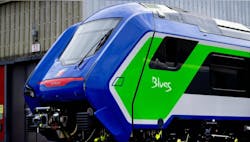Hitachi Rail introduces Social Product Declaration to track environmental and social impacts of its products
Hitachi Rail has pioneered a way to track the environmental and social impacts of its products via a Social Product Declaration (SPD).
The rail firm has completed a Social Product Declaration for it Masaccio hybrid trains, which tracks their ethical life cycle. The system was developed with EDP International and records all the work done by the suppliers across the entire value chain – and evaluate their social performance and adherence to modern, ethical working practices, including employee safety, fair salaries, gender equality, labour laws and rule of law.
This evaluation process spans the entire 30- to 40-year life cycle of a train – from design, sourcing of materials and manufacturing to decommissioning and recycling. The system enables Hitachi Rail to give operators and passengers confidence that the manufacturer - and its network of suppliers – followed ethical and socially responsible working practices.
For many years, Hitachi Rail has calculated the environmental impact of its trains, including the energy they consume, the emissions they produce and the ability to recycle materials at the end of their life, allowing the agency to drive up sustainability standards – optimising efficiency, reducing emissions to zero and achieving 95 percent or higher recyclability for its modern electric trains.
Hitachi Rail designed its new Social Product Declaration in accordance with the United Nation’s Sustainable Development Goals. With more than 20,000 suppliers in its supply chain, Hitachi Rail will create an automated platform to manage the information gathering and certification for future fleets.
“We are proud to launch this world first certification for trains, enabling us to track their social impact from manufacturing to decommissioning and recycling decades later," said Luca D’Aquila, COO Hitachi Rail Group and CEO Hitachi Rail Italy. "This system enables us to assess whether our supply chain follows practices including employee safety, fair salaries and gender equality, giving confidence to our customers and their passengers in the social as well as environmental credentials of our products. By achieving certification for our projects, we are striving to contribute to a more sustainable and socially responsible industry - and hope other companies follow suit."
The Social Product Declaration was third-party verified by the independent SPD verifier Claudia A. Peña and published in the International EPD System, owned by EPD International AB.
“EPD International was the original creator of the Environmental Product Declaration and today, 25 years later, we are proud to be part of the creation of the first ever SPD," said PCR Manager Gustav Sandin, EDP International. Being able to publish a third-party verified declaration of the environmental and social impact of a product life cycle, gives a more complete picture of how a product affects society. We hope to see more organisations publish SPDs of their products and services.”
Hitachi Rail’s Social Product Declaration was designed following testing on its new battery hybrid fleet.
